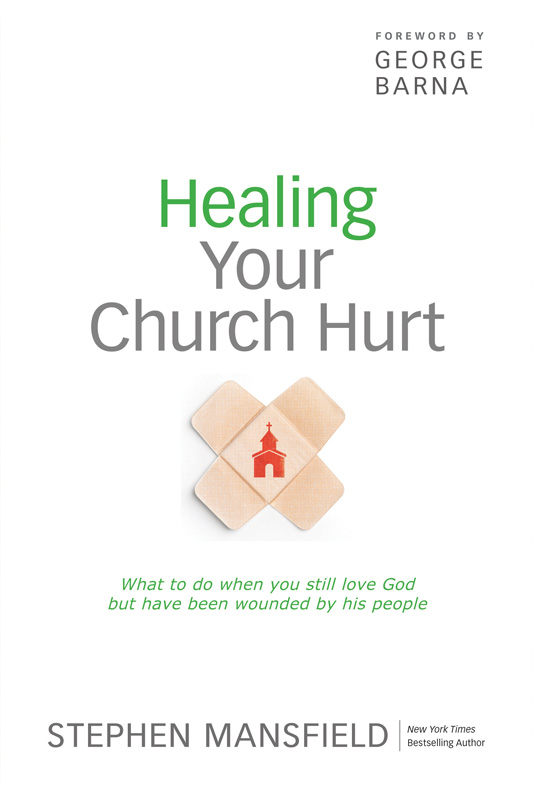Visit Tyndale online at www.tyndale.com.
TYNDALE is a registered trademark of Tyndale House Publishers, Inc.
Barna and the Barna logo are trademarks of George Barna.
BarnaBooks is an imprint of Tyndale House Publishers, Inc.
Healing Your Church Hurt: What to Do When You Still Love God but Have Been Wounded by His People
Copyright 2010 by Stephen Mansfield. All rights reserved.
Previously published as ReChurch: Healing Your Way Back to the People of God under ISBN 978-1-4143-3328-1.
Healing Your Church Hurt first published in 2012.
Cover photograph of bandages copyright by Tyndale House Publishers, Inc. All rights reserved.
Cover image of church copyright by iStockphoto. All rights reserved.
Author photo copyright 2008 by Ben Pearson. All rights reserved.
Designed by Beth Sparkman
Published in association with the literary agency of Esther Fedorkevich, Fedd and Company, Inc., PO Box 341973, Austin, TX 78734.
All Scripture quotations, unless otherwise indicated, are taken from the Holy Bible, New International Version, NIV . Copyright 1973, 1978, 1984 by Biblica, Inc. TM Used by permission of Zondervan. All rights reserved worldwide. www.zondervan.com.
Scripture verses marked Phillips are taken from The New Testament in Modern English by
J. B. Phillips, copyright J. B. Phillips, 1958, 1959, 1960, 1972. All rights reserved.
The Library of Congress has cataloged the original edition as follows:
Mansfield, Stephen, date.
ReChurch : healing your way back to the people of God / Stephen Mansfield.
p. cm.
Includes bibliographical references.
ISBN 978-1-4143-3328-1 (hc)
1. Church membership. 2. Ex-church members. I. Title.
BV820.M22 2010
248.8'6dc22 2009052959
ISBN 978-1-4143-6560-2
To
Bill Ruff
who wept with me
and stayed true
Foreword
The United States is a huge, populous nation. As such, it is home to numerous epidemics. One of them is the dreaded, but widespread ecclesia exitus diseasethe Latin term for church dropout. Perhaps youve experienced itthe decision to permanently withdraw from a congregation you had considered to be your church home. The symptoms are many, but the outcome is unambiguous: pain, disappointment, and spiritual anomie.
Personally, Ive had several bouts of ecclesia exitus over the years. In one case, it was caused when our pastor disagreed theologically with something that I wrote in a book. Rather than confronting me personallythe practice he taught from the pulpit, based on Matthew 18he chose to avoid me and instead go public with his disenchantment. And he didnt do it by just bad-mouthing me to a few of the faithful: he wrote an entire book on the subject, using me as his unknowing, voiceless foil. When I asked him why he had not contacted me first to discuss his concerns so that we could resolve our differences as mandated in Matthew 18, his response was that if I had a problem with his approach, well, tough luck. Shocked and wounded by the hypocrisy of his actions, and his unwillingness to engage in further conversation regarding his actions, my family and I sought another church to call home.
In another instance, I was serving in a leadership capacity at a church when the senior pastor became uncontrollably jealous of the national attention that my ministry was receiving. He froze me out of leadership meetings and regular processes, and made comments about me to other congregational leaders that were both untrue and unfair. Because he was not willing to admit to me that these things were happening, and other people in the congregation were becoming increasingly upset by the odd behavior of their pastor, it seemed that the most honorable thing for me to do was leave that body. Although the environment had become toxic, it was still a crushing blow for me and my family.
Another instance stemmed from how a predominantly white, affluent congregation treated my Hispanic daughters. All of my daughters are adopted, and two of them are from a Latin American country. While my wife and I were welcomed with open arms by the congregation, the distasteful treatment accorded to our little girls in their Sunday school classesby teachers and students alikemade it impossible for us to stay put. Once again, the gap between what was preached and what was practiced made it unbearable for us to remain in our church home.
All of these examples are recalled simply to say that I understand the pain involved in being chewed up by a churcha place where you go to worship God, to become more Christlike, to serve others, to enjoy positive relationships with other Christ followers, and to have a safe and reliable place to bring truth seekers for exposure to biblical principles in thought, word, and deed. It can be a shattering reality when your church home becomes a place of rejection and suffering while you are doing your best to be part of the spiritual family. It turns your world upside down, births a variety of spiritual doubts, and leaves a sour taste in your mouth.
If you think about it, though, the causes of ecclesia exitus have been afflicting the Lords people since the beginning of church history.
Jesus was sent to save the Jews, whose leaders rejected and conspired to orchestrate His murder, in defiance of the spiritual laws and principles that they taught fellow Jews.
Pauls letters were written to churches that were distorting the principles provided by Jesus and consequently hurting many people through the misapplication of His truths and admonitions.
The description of five of the seven churches depicted in Revelation 2 and 3 reflect congregations that did a poor job of handling Jesus teachingsand Gods people.
Even the early church leaders were guilty of infighting and bitterness. Paul had a less-than-amicable parting of ways with John Mark and Barnabas despite a successful initial missionary journey.
Conflict and interpersonal pain are as old as humanity. Perhaps not surprisingly, such difficulties have been present in the Christian Church from its origins, and are likely to be part of every human institution until the end of the age.
Our contemporary culture certainly fans the flames of ecclesia exitus . Think about the way in which millions of people interpret fundamental Christian principles and behaviors. Grace is interpreted by many as a weakness to be exploited. Compromise is seen as a loss of substance or courage. Discernment is criticized as intolerance. Blame and retribution are preferred to forgiveness and mercy. In our society, behaving with kindness and humility is often considered with disdain: the choice of losers and wimps.
The paradox inherent in all of this is that the inconsistencies and harshness of our society often drive us toward the most tangible and widely promoted expression of Christianitythe local church, an assumed oasis of perfection and goodness, a place where sinners are transformed into reasonable facsimiles of Christ Himself. But that expectation is often shattered. After all, the local body of believers is still a collection of sinners seeking a place where they can discover wisdom, truth, grace, healing, and love. No local church will ever be perfect as long as people are part of it. In our thirst to experience the righteousness of God, we sometimes forget that we have the capacity to wound others, even in a spiritual environment, as well as a higher-than-desirable probability of being wounded by a community of faith.














